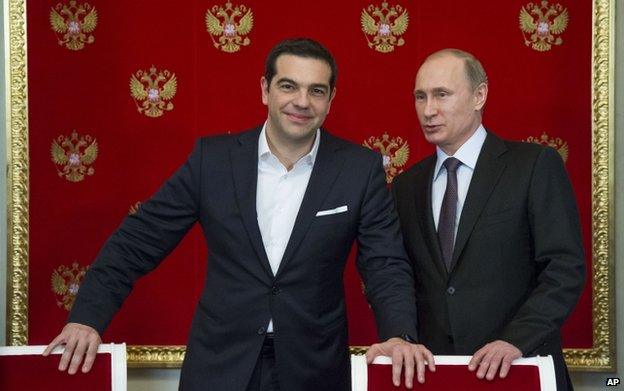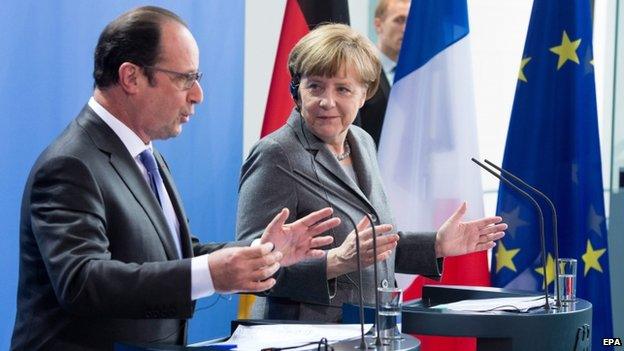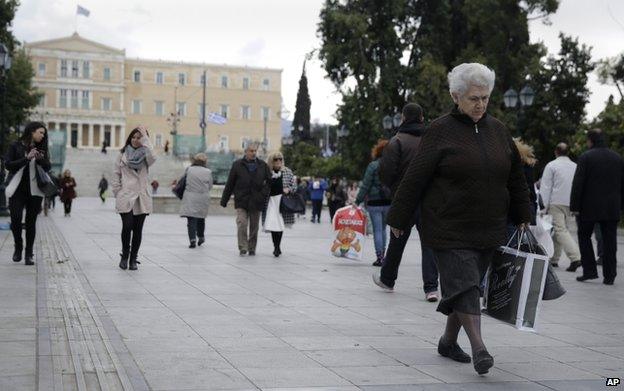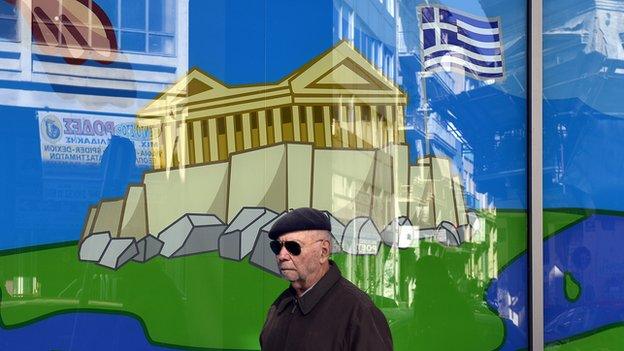Greece played its Russia card.. Now what?
- Published
- comments

Greek PM Alexis Tsipras (left) looked confident as he met Russian President Vladimir Putin in Moscow
So they've huffed and they've puffed but they haven't yet managed to blow the house down.
The house of eurozone regulations, that is.
Since coming to government in January, Alexis Tsipras and company have tried all sorts of ruses: foot-stamping, obfuscating and blustering.
There have been threats aimed at the eurozone's largest economy, Germany, to flood it with illegal migrants including militant extremists, to seize private German property in Greece over a World War Two reparations row and, most recently, the playing of the Russian card.
Along the lines of: "If you don't release the bailout money we need and cut us some slack with our anti-austerity reforms, we can cosy up to Russia, a fellow Orthodox country that is powerful, threatening and extremely keen to drive a wedge in EU and Nato unity. If you don't help us, EU, we have other options."
Clumsy move?
Realistically, though, Greece is firmly entrenched in the European Union and Nato and everyone knows that. Though undeniably irritated by the Moscow visit, EU leaders have played it down.
German Chancellor Angela Merkel and French President Francois Hollande laconically observed that they had also been to Moscow and still remained in the EU.

Angela Merkel (right) and Francois Hollande have said they want Greece to stay in the eurozone
Posturing in Russia was arguably yet another clumsy move by the new Greek prime minister squeezed between the far left of his party, a desperate, resentful electorate and Greece's international creditors.
Mr Tsipras's visit to Moscow coincides with a repayment to the IMF of around €450m (£330m; $490m). Greece says it has scraped the cash together and will make the bank transfer on Thursday, but ever more debt repayments loom as do pension payments and public sector salaries.
Greece needs financial help from the group it is already in - the eurozone - rather than from Russia which is nursing its own economic wounds inflicted by Western sanctions and low oil prices.
Minds here in Brussels are focused on the end of the month when the eurozone's finance ministers meet.
Widespread frustration
Greece is gasping for a remaining €7.2bn in bailout funds. But even if it is finally released - Greece's reform programme pending - will that be enough?
There's increasing talk of Greece needing a third bailout by the summer and the mood is darkening in Brussels and across the eurozone.

Many people in Greece feel they have suffered under austerity measures
It is important to emphasise that most countries are still keen to keep Greece in - partly because of Russia, and also because anything else would mean that austerity measures and years of eurozone tax payers' money spent propping up Greece had all been for nothing.
But frustration is widespread.
Of course, Mrs Merkel, queen of the eurozone's largest economy, is key.
I spoke to a German MEP close to the German chancellor who told me that, when he saw her recently, she was totally exasperated and said she was running out of ideas about to how to help Greece.
As a pragmatist rather than an ideologue, she will weigh up very carefully whether her party and, most importantly, her electorate will countenance a third bailout.
Like Mr Tsipras, she too is squeezed - in her case, between the more conservative elements in the Christian Democratic Union (CDU), the Eurosceptic Alternative for Germany (AfD) party and an increasingly Greek-phobic public.
Bets are on
This is uncharted territory.
On the one hand, the eurozone agreement contains no legal provisions for a member country to leave or be expelled.
On the other, no-one knows if Greece's unconventional, passionate politicians will in the end prefer to go down in political flames than backtrack on all their electoral promises under duress from EU institutions.
Perhaps that is why Alexis Tsipras looked so confident on Wednesday afternoon, sitting in the press conference with Vladimir Putin, thumbing his nose at EU sanctions against Russia even as he needs their architects' goodwill to bail his country out of financial misery.
Maybe he feels that, for him, this is a win-win situation even if it's an uncomfortable one.
Bets are on that the eurozone will do its own foot-stamping, obfuscating and blustering but in the end roll-over Greece's debt and find a compromise solution.
And even if not, and Greece does fall out of the eurozone, Mr Tsipras will probably go down in Greek history as the leader who dared to take on the Big Boys in Brussels in an attempt to achieve social justice and restore his country's honour.
- Published12 March 2015

- Published3 March 2015
- Published18 March 2015